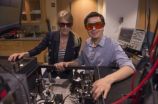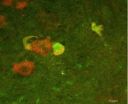(Press-News.org) A majority of middle-aged men and women eligible to take aspirin to prevent heart attack and stroke do not recall their doctors ever telling them to do so, according to a University of Rochester study of a national sample of more than 3,000 patients.
Published online by the Journal of General Internal Medicine, the finding illustrates a common disconnect between public health guidelines and what occurs in clinical practice. The UR study is consistent with other research showing that physicians often do not recommend aspirin as prevention therapy to the general population, despite established guidelines by the U.S. Preventative Services Task Force.
Several reasons might explain the reluctance, such as competing demands and limited time to properly assess a patient's eligibility for aspirin, according to lead author Kevin A. Fiscella, M.D., M.P.H., professor of Family Medicine at the UR School of Medicine and Dentistry.
Uncertainty about the benefits of aspirin therapy versus potential harms like bleeding in the digestive track, also hinder physicians' decisions, the study said.
For the JGIM study, Fiscella's group analyzed data from 3,439 patients included in the 2011-'12 National Health and Nutrition Examination Survey (NHANES). None of the patients had cardiovascular disease, but all qualified for aspirin therapy based on their 10-year risk score for factors such as diabetes, high blood pressure, obesity, smoking, and use of cholesterol-lowering medications.
Of the sample, 87 percent of men and 16 percent of women were eligible to take aspirin as a preventive measure. But when they were asked the question -- "Doctors and other health care providers sometimes recommend that you take a low-dose aspirin each day to prevent heart attack, strokes, or cancer. Have you ever been told to do this?" -- a low rate of 34 percent of the men and 42 percent of the women said yes.
Co-author John Bisognano, M.D., Ph.D., director of outpatient cardiology services at UR Medicine, said most physicians can agree on approaches to medical care in immediately life-threatening situations, but have less enthusiasm to quickly embrace preventive guidelines, particularly when they involve wide-ranging interventions for a large segment of the population.
New studies that present conflicting data or re-interpret older data also complicate the issue and can be confusing for patients, he said. Despite the USPSTF guidelines for aspirin being published in 2009, for example, the FDA declined to approve the same recommendations as recently as last spring.
"Patients often view changes as an illustration that folks in the medical field can't really make up their minds," said Bisognano, professor of Medicine. "Changes can undermine a practitioner's or patient's enthusiasm to immediately endorse new guidelines because they wonder if it will change again in three years."
But science and medical practice is fluid, he said, and the only way to move the field forward is to continually understand and look for ways to apply the new data and avoid assumptions of the past.
The study also noted that using expanded primary care teams of nurses, medical assistants, and health educators may help to reduce the volume of decisions that rest solely with the physician at the office visit. Sharing care can improve agreement between published guidelines, the use of risk models, and actual practice, the study said.INFORMATION:
The authors report no conflicts, and no external funding sources. END
Baby aspirin? Many doctors don't recommend, despite guidelines
2014-08-05
ELSE PRESS RELEASES FROM THIS DATE:
Pistachios may lower vascular response to stress in type 2 diabetes
2014-08-05
Among people with type 2 diabetes, eating pistachios may reduce the body's response to the stresses of everyday life, according to Penn State researchers.
"In adults with diabetes, two servings of pistachios per day lowered vascular constriction during stress and improved neural control of the heart," said Sheila G. West, professor of biobehavioral health and nutritional sciences. "Although nuts are high in fat, they contain good fats, fiber, potassium and antioxidants. Given the high risk of heart disease in people with diabetes, nuts are an important component of a ...
Watching chemistry in motion: Chemical environments mapped using molecular vibrations
2014-08-05
Scientists have long known that a molecule's behavior depends on its environment. Taking advantage of this phenomenon, a group of researchers at the University of Chicago developed a new technique to map microscopic environments using the vibrations of molecules.
"It's a special new advance that will be broadly useful in studies of molecular and materials phenomena," said Andrei Tokmakoff, the Henry G. Gale Distinguished Service Professor in Chemistry at UChicago. He and two of his associates report their new technique in a paper published online in the journal Optics ...
Physicists eye neural fly data, find formula for Zipf's law
2014-08-05
Physicists have identified a mechanism that may help explain Zipf's law – a unique pattern of behavior found in disparate systems, including complex biological ones. The journal Physical Review Letters is publishing their mathematical models, which demonstrate how Zipf's law naturally arises when a sufficient number of units react to a hidden variable in a system.
"We've discovered a method that produces Zipf's law without fine-tuning and with very few assumptions," says Ilya Nemenman, a biophysicist at Emory University and one of the authors of the research.
The ...
'Treatments waiting to be discovered' inside new database
2014-08-05
Your genes are blueprints for proteins, and molecules called microRNA can help to determine how often these genetic blueprints are manufactured into proteins. Researchers often ask what microRNA regulates a gene related to disease. Or what gene is regulated by a microRNA found in sick patients? The answers to these questions could help doctors and researchers manipulate protein levels in the body that cause disease, especially cancer. A University of Colorado Cancer Center study recently published in the top-ranked journal Nucleic Acids Research (NAR) describes a database ...
Monthly preventative treatment with a new drug combination reduces malaria in children
2014-08-05
Preventative treatment with a monthly dose of a newer antimalarial drug can reduce the risk of malarial infection among young children, according to a study published in this week's PLOS Medicine. The study, conducted by Victor Bigira and colleagues at San Francisco General Hospital and the Makerere University College of Health Sciences in Kampala, Uganda, finds that treating young children with dihydroartemisinin-piperaquine (DP) decreased their risk of contracting malaria.
Preventative treatment of malaria is a useful strategy to protect young children in Africa, but ...
Pregnant women are often given inappropriate treatment for malaria
2014-08-05
Not all pregnant women with symptoms of malaria seek care from their formal healthcare system and if they do seek care, they may be given inappropriate treatment because healthcare providers often fail to adhere to the standard (World Health Organization-WHO) diagnostic and treatment guidelines, according to a study by UK researchers published in this week's PLOS Medicine.
The authors (led by Jenny Hill from the Liverpool School of Tropical Medicine) reached these conclusions by reviewing all relevant studies that investigated the factors that affect pregnant women's ...
A campaign involving Muslim clerics has increased uptake of polio vaccination in Nigeria
2014-08-05
A coalition campaign involving imams, Islamic school teachers, traditional rulers, doctors, journalists, and polio survivors is gradually turning the tide against polio vaccine rejection in northern Nigeria, according to experts from Nigeria writing in this week's PLOS Medicine.
Sani-Gwarzo Nasir (from the Federal Ministry of Health in Nigeria) and colleagues describe how anti-polio propaganda, misconceptions, and violence against vaccinators present huge challenges to polio eradication in Nigeria but perhaps most profound is the rejection of vaccination by Muslim clerics.
However, ...
Just one simple question can identify narcissistic people
2014-08-05
COLUMBUS, Ohio – Scientists have developed and validated a new method to identify which people are narcissistic: just ask them.
In a series of 11 experiments involving more than 2,200 people of all ages, the researchers found they could reliably identify narcissistic people by asking them this exact question (including the note):
To what extent do you agree with this statement: "I am a narcissist." (Note: The word "narcissist" means egotistical, self-focused, and vain.)
Participants rated themselves on a scale of 1 (not very true of me) to 7 (very true of me).
(How ...
Salk scientists uncover new clues to repairing an injured spinal cord
2014-08-05
LA JOLLA—Frogs, dogs, whales, snails can all do it, but humans and primates can't. Regrow nerves after an injury, that is—while many animals have this ability, humans don't. But new research from the Salk Institute suggests that a small molecule may be able to convince damaged nerves to grow and effectively rewire circuits. Such a feat could eventually lead to therapies for the thousands of Americans with severe spinal cord injuries and paralysis.
"This research implies that we might be able to mimic neuronal repair processes that occur naturally in lower animals, which ...
Year-round preventive treatment reduces malaria risk in young children
2014-08-05
A year-round preventive drug treatment substantially reduces young children's risk of contracting malaria and poses no serious risk of adverse events, according to a study by researchers funded by the National Institutes of Health.
The findings demonstrate that prolonged treatment given from 6 to 24 months of age is safe and effective for young children, according to the study authors. Year-round preventive measures are badly needed in locations like Uganda, where the study took place, and where malaria rates remain high throughout the year.
Most previous studies using ...

